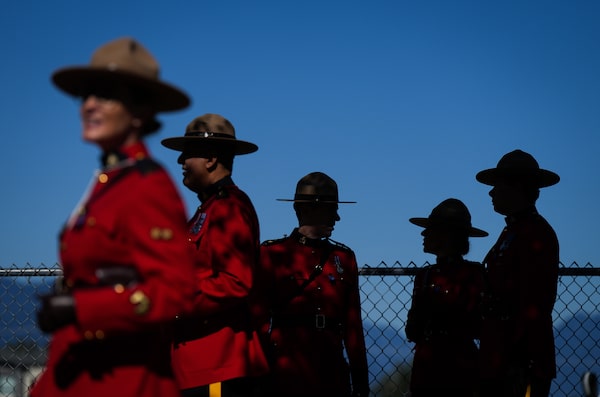
RCMP officers in Red Serge wait for a change-of-command ceremony and parade to begin, in Langley, B.C., Tuesday, Sept. 20, 2022.DARRYL DYCK/The Canadian Press
The RCMP branch dedicated to investigating Canada’s most sophisticated criminals is understaffed, the police force says.
The Mounties’ federal policing wing has “experienced a shortfall over the past decade of approximately 1,000” police officer positions, said RCMP spokeswoman Marie-Eve Breton, who explained that the branch has 507 fewer police officers than it did a decade ago and has funding for an additional 500 positions that have gone unfilled as well. In an e-mail to The Globe and Mail, she said federal policing only has about 5,000 employees, whereas an optimal complement would be more like 6,000.
The RCMP have two main policing obligations: contracts with most provinces to provide police officers for local and regional law enforcement, and its federal policing wing, whose investigators focus on national and international crimes such as money laundering, foreign interference and drug trafficking, among other offences.
While the RCMP’s ranks are often thin across all parts of Canada, the national security and intelligence committee of parliamentarians (NSICOP) released a report last week that identified “several challenges faced by Federal Policing that risk having an impact on its essential role in countering threats to Canada’s national security or investigating serious and major organized crime” – among them the fact that hundreds of positions have been lost to attrition within the branch over the past nine years.
This matters, the parliamentarians said, because within Canada that branch “is the only organization capable of conducting investigations of the most significant criminal threats across jurisdictions.”
But the NSICOP report points out that the RCMP are legally required “to maintain (or increase upon request) staffing in contract jurisdictions, regardless of its other priorities. As a consequence, the RCMP’s contract obligations take priority when filling personnel gaps” – even though statistics show Canada is increasingly vulnerable to borderless threats such as international money laundering, violent organized crime groups and the spread of violent extremist ideologies.
“Federal Policing has been unable to recruit sufficient numbers of officers with the requisite experience and skills to keep up with the demand as regular members retire,” the report says.
The parliamentarians are urging Public Safety Minister Dominic LeBlanc to direct the RCMP to fix their staffing woes. If he cannot, then “it may be time for Canada to consider a stand-alone federal policing organization,” wrote NSICOP’s MPs and senators, who have been using their special security clearances to investigate the RCMP since 2021.
Garry Clement, a former Mountie and author of a new book, Under Cover: Inside the Shady World of Organized Crime and the RCMP, said he has been suggesting for years that federal policing duties should be split off from the force.
“I think Canada has serious, serious problems,” he said. “We are a stomping ground for transnational crime.”
Queen’s University security expert Christian Leuprecht said the RCMP have an ingrained habit of “cannibalizing” resources from some teams of investigators to feed other ones.
In an interview Mr. Leuprecht recalled how RCMP Commissioner Michael Duheme responded this summer to growing concerns about foreign interference rings in Canada by telling a parliamentary committee that the force has opened up more than 100 investigations on the file.
But such figures are “completely meaningless,” Mr. Leuprecht said, because “there’s no capacity to prosecute sleeper agents any time soon.” He said police have to be judged on whether they finish their investigations, not whether they start ones.
“The RCMP loves to say: ‘Well, we’ve got these open files.’ But nothing really happens on these files,” said Mr. Leuprecht, the author of Dirty Money: Financial Crime in Canada. “Or in the worst-case scenario they fall apart.”
The NSICOP report says that a decade ago the RCMP’s federal policing wing launched nearly 150 investigations a year that it considered top-tier. But these days, the force is launching fewer than 50 annually.
The report outlines some RCMP plans to address the issues. Some commanders have suggested moving more investigators into big cities, where sophisticated crime is rooted. Another is the creation of a specialized school, where officers can become as tech-savvy and financially literate as many of the criminals they are investigating.
Yet these initiatives have never gotten off the ground.
“Federal Policing intends to relocate resources to areas where the majority of federal policing investigations are concentrated: Vancouver, Calgary, Edmonton, Toronto, Ottawa and Montreal,” the report says. “Delays caused it to be postponed and there is currently no timeline for its implementation.”
And “in 2021, Federal Policing developed a proposal for a Federal Policing Training Academy,” the report continues. “This proposal was not approved by the Senior Executive Committee.”
 Colin Freeze
Colin Freeze